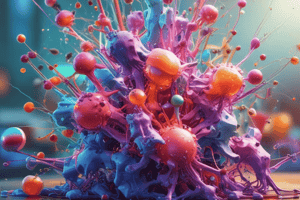Podcast
Questions and Answers
What is the main focus of physical chemistry?
What is the main focus of physical chemistry?
- Exploring the properties of elements and compounds
- Studying matter and what it's made of
- Investigating the relationships between energy, thermodynamics, and chemical systems (correct)
- Analyzing the structures of organic molecules
Which concept in physical chemistry deals with changes in heat, work, and temperature of a system during chemical reactions?
Which concept in physical chemistry deals with changes in heat, work, and temperature of a system during chemical reactions?
- Intermolecular forces
- Atomic structure
- Thermodynamics (correct)
- Chemical equilibrium
What does chemical kinetics focus on studying?
What does chemical kinetics focus on studying?
- Atomic structure
- Phase transitions
- Reaction rates (correct)
- Energy relationships in chemical systems
Which area of chemistry seeks to understand why chemicals behave as they do from both experimental and theoretical perspectives?
Which area of chemistry seeks to understand why chemicals behave as they do from both experimental and theoretical perspectives?
What does organic chemistry primarily focus on studying?
What does organic chemistry primarily focus on studying?
Which branch of chemistry studies the statistical mechanics central to processes like phase transitions and chemical equilibrium?
Which branch of chemistry studies the statistical mechanics central to processes like phase transitions and chemical equilibrium?
What is the primary focus of statistical mechanics?
What is the primary focus of statistical mechanics?
Which factor does chemical kinetics primarily examine in relation to reaction velocity?
Which factor does chemical kinetics primarily examine in relation to reaction velocity?
Why does increasing temperature generally accelerate most chemical reactions according to the collision theory?
Why does increasing temperature generally accelerate most chemical reactions according to the collision theory?
What does the rate law in chemical kinetics describe?
What does the rate law in chemical kinetics describe?
In organic chemistry, what is the significance of recognizing functional groups and their reactivity patterns?
In organic chemistry, what is the significance of recognizing functional groups and their reactivity patterns?
Why is stereochemistry important in organic chemistry, especially for medicinal chemists?
Why is stereochemistry important in organic chemistry, especially for medicinal chemists?
Flashcards are hidden until you start studying
Study Notes
Exploring Chemical Worlds: Physical Chemistry, Kinetics, Organic Chemistry
Chemistry is the science that studies matter—what it's made of, how it behaves, and what happens when elements and compounds interact with each other. This expansive field encompasses various specialized branches, each offering unique insights into our understanding of the world around us. In this overview, we will delve into three fundamental areas of chemistry: physical chemistry, chemical kinetics, and organic chemistry.
Physical Chemistry
Physical chemistry focuses on investigating the relationships between energy, thermodynamics, and chemical systems through experimentation and theory development. It explores properties such as atomic structure, intermolecular forces, and statistical mechanics, which are central to comprehending processes like phase transitions, chemical equilibrium, and reaction rates. Essentially, it seeks to understand why chemicals behave as they do from both experimental and theoretical perspectives.
Two crucial concepts within physical chemistry include:
-
Thermodynamics: A branch studying the changes in heat, work, and temperature of a system during chemical reactions under different conditions. Understanding thermodynamic principles helps chemists predict whether a specific reaction can occur spontaneously without additional input of external energy.
-
Statistical Mechanics: An approach examining microscopic behavior using probability distributions to describe macroscopic properties. Modeling complex interactions among particles enables physicochemists to better explain phenomena such as critical points, diffusion in solids, and conformational transitions in biomolecules.
Chemical Kinetics
This area of study deals with the rate at which chemical reactions proceed. By determining factors affecting reaction velocity, such as concentration, temperature, pressure, and catalysis, one may optimize reaction pathways for synthesis purposes or gain insight into natural processes like combustion or respiration. Central tenets include the collision theory, Arrhenius equation, and mechanisms representing reaction sequences.
Consider these key aspects of chemical kinetics:
-
Collision Theory: Describes how reactant molecules must collide with adequate speed and proper orientation to form products. It explains why increasing temperature accelerates most reactions yet does so differently depending upon reaction type.
-
Rate Law: Represents the relationship between reaction rate and concentrations of reactants present. Derived mathematically by analyzing data obtained via initial rate experiments, it provides essential information regarding reaction order and overall rate constant.
-
Reaction Mechanism: A stepwise description of molecular events occurring during a reaction sequence. Comprehensively elucidated mechanisms serve as cornerstones for rationalizing observed experimental outcomes while providing essential guidance for researchers seeking new synthetic routes.
Organic Chemistry
Organic chemistry specializes in the study of carbon-containing compounds, particularly their structures, reactivities, and transformations. This branch has tremendous importance due to its involvement in producing pharmaceuticals, plastics, dyes, fragrances, agrochemicals, and various materials used daily.
Some core themes of organic chemistry include:
-
Functional groups and their reactivity patterns: Recognition of recurring structural features in many organic compounds allows chemists to anticipate and control chemical reactions more effectively. For example, hydroxyl (-OH) and carboxylic acid (-COOH) functional groups have well-defined reaction tendencies and characteristics.
-
Stereochemistry: Investigates spatial arrangement of atoms in chiral molecules. Knowledge of stereoisomerism offers valuable insights for medicinal chemists designing drugs selectively targeting biological macromolecules.
-
Synthetic methods: Strategies for constructing targeted organic molecules with high efficiency, selectivity, and minimal waste generation. The ability to design innovative synthetic approaches facilitates the discovery of novel materials and therapeutic agents.
In summary, exploring chemical worlds necessitates the interdisciplinary knowledge of physical chemistry, chemical kinetics, and organic chemistry. These fields offer comprehensive insights into the fascinating realm of matter and its transformation, enabling chemists to rationally develop applications and solutions shaping modern society.
Studying That Suits You
Use AI to generate personalized quizzes and flashcards to suit your learning preferences.




